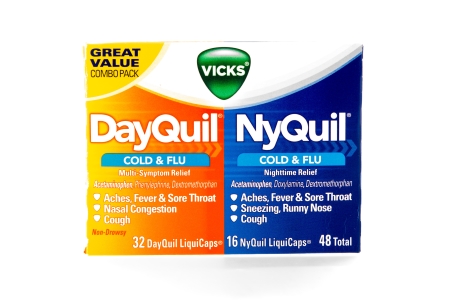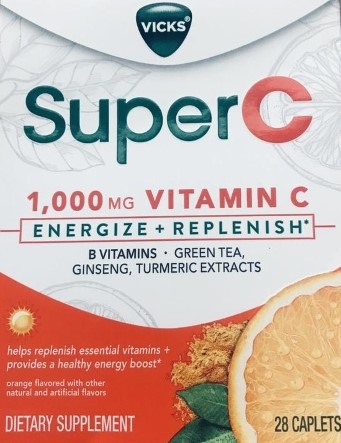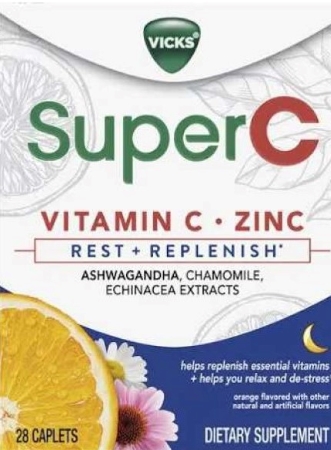P&G Wraps Launch Of Super C Supplement Brand In Co-Packaging With DayQuil And NyQuil OTCs
Strategy Could Test FDA Policy As Well As Promote Product In Immunity Supplement Sector
Executive Summary
P&G could be using a door left open in FDA’s 2015 proposed rule that questioned the safety of offering co-packaged supplements and drugs. With OTC drug and supplement firms always looking to drive sales growth, competitors large and small could follow P&G through the door.
Procter & Gamble enters the market of vitamin C formulations also containing zinc and other mineral or herbal ingredients by launching its products co-packaged with two of its best-known OTC drug brands, Vick’s DayQuil and NyQuil cold remedies.
While offering its Vicks Super C dietary supplement formulations in the US in packages with DayQuil or NyQuil helps get consumers’ attention to the brand, P&G’s strategy also tests the Food and Drug Administration’s policy, as stated in a proposed rule, questioning the safety of offering co-packaged supplements and drugs.
But the global manufacturer and marketer of health, personal and household care items could be using a door the FDA’s 2015 proposed rule left open, food and drug law attorneys say.
Cincinnati-based P&G, which is advertising DayQuil/NyQuil co-packaged with Super C in TV commercials, didn’t respond to multiple requests for comment on the brand's launch.
 P&G offers its vicks dayquil and nyquil cold remedies separately and co-packaged, above, and launches its super c energize & Replenish supplement, below, co-packged with dayQuil and super C rest & replenish, bottom, co-packaged with nyquil.
Source: Alamy
P&G offers its vicks dayquil and nyquil cold remedies separately and co-packaged, above, and launches its super c energize & Replenish supplement, below, co-packged with dayQuil and super C rest & replenish, bottom, co-packaged with nyquil.
Source: Alamy
With OTC drug and vitamin, mineral and supplement firms, like businesses across all consumer-packaged good categories, always looking for marketing and advertising changes to drive sales growth, competitors large and small could follow P&G through the door.
“I think it's fraught with regulatory risk,” said Scott Bass, a partner at Sidley Austin LLP in New York and head of its Global Life Sciences team.
“You don't normally want to combine something you use daily with something you only use for an immediate symptomatic relief,” added Bass, who as a congressional staffer helped draft the FDA's supplement manufacturing and marketing regulatory framework when it was passed by Congress in 1994.
Steven Shapiro, of counsel at Rivkin Radler LLP in New York, noted that in the 2015 proposed rule, the FDA includes this explanation for its reservations about co-packaging a drug with a vitamin, mineral or supplement product: “In the case of a dietary supplement co-packaged with a drug, the co-packaging implies that the dietary supplement is intended to be used for a therapeutic purpose.”
“It’s implied that they’re safe when used together and that they work together,” Shapiro said.
However, granting that P&G will have considered whether co-packaging an OTC drug and supplement product would pass regulatory muster, co-packaging an OTC drug indicated to relieve cold symptoms with a supplement product formulated with ingredients known to boost the immune system could be considered as regulatorily compliant.
“I get it. I think that has a rational basis. I'm not saying it's okay, I'm just saying I think it has a rational basis,” Bass said.
“In the case of a dietary supplement co-packaged with a drug, the co-packaging implies that the dietary supplement is intended to be used for a therapeutic purpose.” – FDA proposed rule
Shapiro noted language in the proposed rule that could’ve led P&G to see an opportunity to co-package its OTC brands with Super C products.
The proposed rule states that in a drug with combined ingredients or in co-packaged drugs, “each active ingredient must make a contribution to the effect(s) of the combination, enhance the safety or effectiveness of an active ingredient, or minimize the potential for abuse of an active ingredient.” With those products, a marketer “would be required to show that each active ingredient contributes to the effect(s) of the combination.”
“It looks like they are doing exactly what FDA says can be done,” said Shapiro.
Add Herbals Or Minerals To Vitamin C, Drive Sales
Available in solid, liquid and powder formats, DayQuil (acetaminophen, dextromethorphan, phenylephrine and guaifenesin) and NyQuil (acetaminophen, phenylephrine, dextromethorphan and doxylamine) are offered in their Severe Cold & Flu formulations and Liquicap format in co-packages also containing Super C.
P&G, which also co-packages multiple formulations of DayQuil and NyQuil, regularly identifies the products as key OTC drug brands among its health care business sales drivers.
And just as regularly, marketers of vitamin C formulations also containing zinc or other herbs and minerals say those products are key sales drivers.
P&G offers Super C caplets in two formulations: packaged with DayQuil is Energize & Replenish with vitamins C, B6 and B12, thiamin, calcium and a blend of extracts from turmeric rhizome, ginseng root and green tea leaf; packaged with NyQuil is Rest & Replenish with vitamin C, calcium, zinc, copper and a blend of extracts from ashwagandha root and leaf, echinacea herb and chamomile flower.
Super C, labeled as made in Austria, enters the cold-shortening product category featuring Church & Dwight Co. Inc.’s Zicam and Viatris Inc.’s Cold-Eeze homeopathic lines, and the supplement brand Emergen-C owned by Pfizer Inc. and marketed by its consumer health joint venture with GlaxoSmithKline plc.
As well, numerous supplement brands combine vitamin C with additional nutrients as formulations promoted to boost immune system health.
Zicam, labeled with zinc as its only active ingredient and with ascorbic acid, or vitamin C, as an inactive ingredient, and Cold-Eeze, labeled with zinc but no vitamin C, differ from Super C and Emergen-C with labeling as homeopathic drugs and directions to use at the onset of cold symptoms and until symptoms are gone. Super C and Emergen-C, which is offered only in powder form, are labeled as dietary supplements with directions for ongoing, daily use.
In 2013, an industry self-regulation group rejected a challenge by the original owner of the Cold-Eeze brand to the original Zicam brand owner’s use of “pre-cold” claims that set the product apart in the market. (Also see "Matrixx Keeps “Pre-Cold” With NAD Ad Victory" - HBW Insight, 22 Aug, 2013.)
The Zicam line, which Church & Dwight acquired in 2020, includes lozenge, medicated drop, nasal spray and swab, oral spray and RapidMelt formats with cold shortening, nasal health/congestion relief and allergy relief indications. (Also see "Church & Dwight Takes Homeopathic Turn For OTC Sales Driver, Acquires Zicam Marketer Matrixx" - HBW Insight, 1 Dec, 2020.)
In addition to its original and enhanced Everyday Immune Support versions, Emergen-C is available in energy, botanical, probiotic, hydration, sleep and children’s formulations. Pfizer acquired the brand from Alacer Inc. in 2012. (Also see "Alacer Sale Underscores Value-Add Of Best Practices" - HBW Insight, 14 May, 2012.)
In a drug with combined ingredients or with co-packaged drugs, “each active ingredient must make a contribution to the effect(s) of the combination" and a marketer “would be required to show that each active ingredient contributes to the effect(s) of the combination.” – FDA proposed rule
Cold-Eeze offers lozenges and gummies in an extra-strength cold-shortening formulation and in prevention formulations including herbs and minerals. Mylan NV acquired the Cold-Eeze line from ProPhase Labs Inc. to be the centerpiece of its US OTC business in 2017. (Also see "Cold-Eeze Deal Puts Homeopathic Brand At Center Of Mylan Consumer Business" - HBW Insight, 17 Jan, 2017.)
Mylan merged in 2020 with Pfizer’s Upjohn off-patent and mature brands unit to form Viatris, which has been investing heavily in its flagship OTC erectile dysfunction brand, Viagra Connect (sildenafil). (Also see "Viatris Welcomes ‘Healthy Competition’ For UK OTC Erectile Dysfunction Top Spot" - HBW Insight, 4 Oct, 2021.)
‘Does Not Otherwise Affect FDA Policy On Supplements’?
DayQuil and NyQuil are available under FDA OTC drug monographs, which don’t impose pre-market approval requirements; as a supplement containing ingredients long available in the US, Super C also isn’t subject to any pre-market clearance by the FDA.
Among major consumer health product marketers in the US, P&G is apparently the first to offer OTC drugs and supplements in a single package since the FDA in 2015 published a proposed rule stating that supplements co-packaged with OTC drugs would be considered unapproved new drugs.
Zinc, Vitamin C Don't Reduce COVID-19 Symptoms
While claims for shortening the durations of colds drive sales for zinc and vitamin C formulations, Cleveland Clinic researchers recently cautioned consumers not to expect the products to significantly help treat symptoms of COVID-19 infections.
Results from a clinical trial with 214 adults who had a diagnosis of severe acute respiratory syndrome coronavirus 2 (SARS-CoV-2) showed no significant difference among the treatment groups in number of days to reach no presence of fever, cough, shortness of breath or fatigue, or in number of days required to reach a 50% reduction in symptoms. (Also see "Zinc, Vitamin C Don't Reduce COVID-19 Symptoms; Impact On Shortening Colds Not Questioned" - HBW Insight, 23 Jul, 2021.)
Still, the obvious marketing appeal likely has led smaller, regional or perhaps micro-regional businesses to offer OTC drugs in packages with vitamin, mineral or supplement products.
The FDA, though, is more likely to notice a large, multi-national business offering major OTC brands co-packaged with a supplement product.
The FDA’s proposed rule – “Fixed-Combination and Co-Packaged Drugs: Applications for Approval and Combinations of Active Ingredients Under Consideration for Inclusion in an Over-the-Counter Monograph,” docket FDA-2015-N-1260 – would extend FDA regulations on Rx fixed-combination drugs to products with prescription and nonprescription ingredients, co-packaged drugs and combinations of active ingredients under consideration for inclusion in an OTC monograph.
It also states that supplements co-packaged with OTC drugs would be considered unapproved new drugs because they are sold with a drug product.
“When used as part of a fixed-combination or co-packaged drug, dietary supplements are considered to be an active ingredient in that product and subject to the requirements of this proposed rule,” the proposed rule states.
Otherwise, in a statement that prompted supplement industry stakeholder response, the FDA said the “proposed rule does not otherwise address nor affect FDA policy on dietary supplements.”
The overall language of the proposed rule indicates it would affect the supplement industry, with the proposal’s definition of dietary supplements as drugs when co-packages short-sighted and unfair, said the Council for Responsible Nutrition in May 2016 comments. (Also see "OTC, Supplement Co-Packaging Potential Could Be Clipped By FDA Proposed Rule" - HBW Insight, 29 Aug, 2017.)
While deeming dietary supplements as drugs when co-packaged with a drug, the proposed rule also explains that that drugs packaged together could “pose certain concerns that differ from those of fixed-combination drugs,” including “potential confusion regarding labeling and misuse.”
For OTC drugs, packages with containers of both daytime and nighttime formulations of the same ingredient could be deemed mislabeled under the proposed rule, as well as co-packaged products with little similarity in use, such as an oral analgesic sold in tandem with a topical pain relief product.
The proposed rule, which got renewed attention two years after it was published as co-packaging emerged as a sales driver for firms in the OTC drug and supplement industries, remains pending.
FDA previously has compelled firms that were combining drug and dietary ingredients in a single formulation to cease making and marketing the products, enforcement that met little pushback. (Also see "Bayer Warning Letters Reinforce FDA Ban On Supplement/Drug Combinations" - Pink Sheet, 3 Nov, 2008.)
But offering separate supplement and drug products in a single package differs from combining supplement and drug ingredients in a single formulation, industry says.
The FDA’s Center for Drug Evaluation and Research declined to comment on expectations for progress on the proposal being finalized or on whether the center is considering changes to the proposal. The agency's latest semi-annual unified agenda with non-binding estimates of for regulatory actions lists February 2019 as a target date for publishing a final rule.
In 2017, the CDER said that under the proposed rule, it would determine on a case-by-case basis whether co-packaged nonprescription drugs and vitamin, mineral or supplement products already available in the US are in violation of FDA policy.


